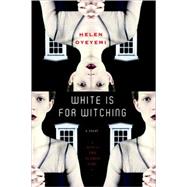
HELEN OYEYEMI is the author of The Icarus Girl and The Opposite House, which The Times (London) named as one of “best novels of the year” and was recently shortlisted for the 2008 Hurston/Wright Legacy Award for fiction. She is currently at work on her fourth novel.
The New copy of this book will include any supplemental materials advertised. Please check the title of the book to determine if it should include any access cards, study guides, lab manuals, CDs, etc.
The Used, Rental and eBook copies of this book are not guaranteed to include any supplemental materials. Typically, only the book itself is included. This is true even if the title states it includes any access cards, study guides, lab manuals, CDs, etc.
Excerpted from White Is for Witching: A Novel by Helen Oyeyemi
All rights reserved by the original copyright owners. Excerpts are provided for display purposes only and may not be reproduced, reprinted or distributed without the written permission of the publisher.